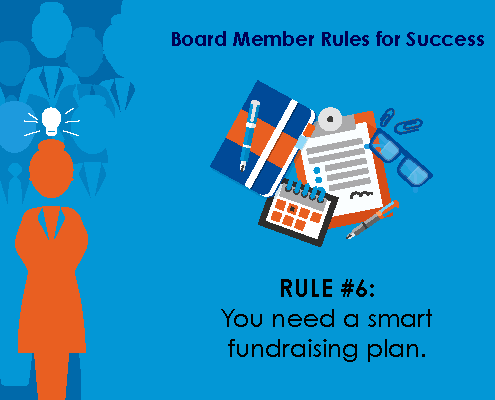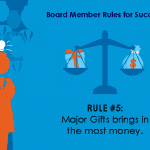Rule #6 for Board Members: You Need a Smart Fundraising Plan

“Why do we need a fundraising plan?” board members sometimes ask. “Who has the time or energy to mess around with fundraising planning?”
There are actually lots of good, quite practical reasons every board member would want to be sure their organization has a smart, strategic fundraising plan.
This post is an excerpt from my video education series for board members: The Board Member’s Guide to Fundraising: 10 Rules for Success Every Board Member Must Know.
It’s an easy guide for board members who want to understand how fundraising works today, what kind of strategies are most effective, and how they can help.
You can find out more and register for the Board Member’s Guide to Fundraising here.
Receive expert advice. Direct to your inbox. Subscribe
1. First of all, fundraising revenue is absolutely critical to your nonprofit’s success.
As a board member, you probably don’t want to leave your vitally important revenue source to chance.
You’d want to make sure your team had a carefully ironed-out game plan for bringing in the essential funding you are planning on this year.
Otherwise how can you know your nonprofit’s income is safe?
2. A fundraising plan helps your organization be super efficient – and effective.
Unorganized efforts eat up tons of unnecessary time and energy.
People are confused. Too many things are tackled at once.
Nothing is done well, because everyone is spread so thin.
And your available volunteer and staff energy is wasted.
Find out how we can help you achieve your fundraising goals with world-class consulting and custom training.
Much better to put people at work deliberately, knowing they are doing the most important activites
3. A fundraising plan helps you raise the most money possible.
When you plan, you step back and review the available resources you have. Then you consider the possible fundraising strategies you can undertake.
Then you make deliberate decisions about which strategies you can reasonably implement.
You’re deciding how to best deploy your limited resources – at their highest and best use.
You can’t possibly implement every fundraising idea that everyone has.
Instead, you only tackle what you have the resources to tackle – and everyone can sleep at night.
4. A fundraising plan helps gain full buy–in from everyone in your organization.
The process of planning your fundraising activities out over the next year helps everyone see the big picture – and why all this fundraising stuff is so important.
It helps gain everyone’s support.
When all your board members see the overall plan – and what the hoped-for results will be, then it’s easy for all the board members, and the staffers on board.
5. A fundraising plan builds everyone’s confidence.
It’s great knowing that there’s a thoughtful plan, with detailed strategies and action plans.
This is a plan you can have confidence in.
This is the road map that will help your organization raise the most money possible.
If you are setting fundraising goals backed up with specific tactics to support each goal, you know you are doing the best you can do.
6. A fundraising plan helps you identify missed opportunities.
Perhaps your team discovers a great opportunity but has no resources to go after it.
Grant funding may be suddenly available and you need more people in grant seeking.
Or your organization realizes that new major gifts may be available, so you switch resources over to support a major gift funding effort.
7. A fundraising plan helps board members be more efficient and effective.
If you plan thoughtfully ahead, you know where board members can make a huge impact.
So board members know that they are spending time in the right places, leveraging their time at the highest and best use.
BOTTOM LINE: Planning strategy is an important job for board members.
Creating a fundraising plan is the time when strategy is on the table.
It’s a time when you can make smart decisions that can dramatically impact the mission of your organization!


